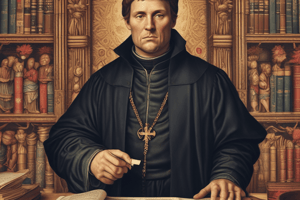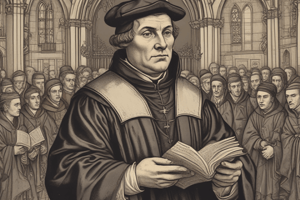Podcast
Questions and Answers
The translation of the Bible into local languages was a result of the Reformation.
The translation of the Bible into local languages was a result of the Reformation.
True (A)
King Henry VIII created the Church of England solely for theological reasons.
King Henry VIII created the Church of England solely for theological reasons.
False (B)
John Calvin is associated with the belief in the concept of predestination.
John Calvin is associated with the belief in the concept of predestination.
True (A)
The Counter Reformation was a response by the Protestant churches to reform themselves.
The Counter Reformation was a response by the Protestant churches to reform themselves.
The Act of Supremacy of 1534 declared King Henry VIII as the Supreme Head of the Church of England.
The Act of Supremacy of 1534 declared King Henry VIII as the Supreme Head of the Church of England.
Total depravity is one of the key tenets of Calvinism.
Total depravity is one of the key tenets of Calvinism.
Mary I was the daughter of King Henry VIII and Catherine of Aragon.
Mary I was the daughter of King Henry VIII and Catherine of Aragon.
The Protestant Reformation led to the establishment of many Protestant churches and movements.
The Protestant Reformation led to the establishment of many Protestant churches and movements.
Martin Luther's thesis questioned why the pope did not use his wealth to build the basilica of St. Peter with his own money.
Martin Luther's thesis questioned why the pope did not use his wealth to build the basilica of St. Peter with his own money.
Lutheranism is considered the first protestant religion and is no longer practiced today.
Lutheranism is considered the first protestant religion and is no longer practiced today.
Johannes Gutenberg's invention of the printing press played a crucial role in spreading Protestant ideas across Europe.
Johannes Gutenberg's invention of the printing press played a crucial role in spreading Protestant ideas across Europe.
The Counter-Reformation was a movement aimed at weakening the Roman Catholic Church.
The Counter-Reformation was a movement aimed at weakening the Roman Catholic Church.
Indulgences were sold at a very low price during the time of Luther.
Indulgences were sold at a very low price during the time of Luther.
Social revolts of the peasants were influenced by Luther's teachings.
Social revolts of the peasants were influenced by Luther's teachings.
Excessive and extravagant behavior was common among priests during the 16th century.
Excessive and extravagant behavior was common among priests during the 16th century.
The spread of Luther's beliefs had no impact on government institutions.
The spread of Luther's beliefs had no impact on government institutions.
Flashcards are hidden until you start studying
Study Notes
State of the Church (16th Century)
- Priests displayed extravagance and excessive lifestyles.
- Indulgences were sold at high prices, creating controversy and discontent.
Martin Luther
- German theologian and religious reformer, deeply interested in monastic life from an early age.
- Key principles include Sola fide (faith alone), Sola gratia (grace alone), and Sola scriptura (scripture alone).
- Authored the 95 Theses, criticizing the Church's practices, particularly aimed at Johann Tetzel’s indulgences.
- Thesis 86 questioned the Pope's wealth compared to the poor believers' contributions for building St. Peter's Basilica.
Spread of Protestant Ideas
- Lutheranism emerged as the first Protestant religion and continues to exist today.
- Luther emphasized that "faith alone" brings salvation; other Protestant denominations differ in beliefs.
- Spread of ideas facilitated by Johannes Gutenberg’s invention of the printing press.
Effects on Politics
- The Counter-Reformation sought to reform the Roman Catholic Church and restore its authority.
- Luther’s teachings influenced governance, straining relations between Church and State.
- Social revolts by peasants were inspired by Luther’s ideology.
Effects on Economy
- Tax noncompliance arose due to revolts; churches faced pillaging.
- Economic instability increased as a result of social upheaval.
Effects on Society
- Laid foundational intellectual concepts for modernism, aided by the printing press.
- Translations of the Bible produced in German, French, and English made religious texts accessible.
- Protestant worship services conducted in local languages instead of Latin.
- Numerous Protestant churches, groups, and movements emerged.
Response of the Catholic Church
- Anticipated response to the Reformation involved initiating the Counter-Reformation for reform and revival.
John Calvin
- Introduced concept of Predestination, asserting that God chooses who will be saved.
- Calvinism includes doctrines such as total depravity, unconditional election, and perseverance of the saints.
- Theocracies were established in regions like France, the Netherlands, and Scotland.
English Reformation
- King Henry VIII's quest for a male heir prompted a major religious shift in England.
- Resulted in his divorcing two wives leading to the formation of the Church of England.
- The Act of Supremacy (1534) declared the King as the Supreme Head of the Church of England.
- Notably, Mary I, daughter of Catherine of Aragon, became a significant figure in English history due to this religious turmoil.
- The emergence of various ideologies led to the Catholic Church's own Counter-Reformation in response.
Studying That Suits You
Use AI to generate personalized quizzes and flashcards to suit your learning preferences.




